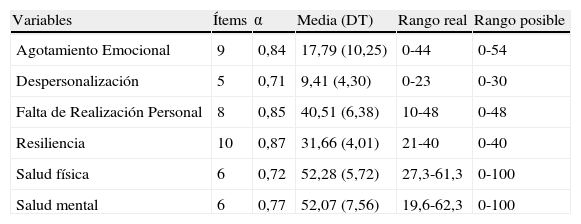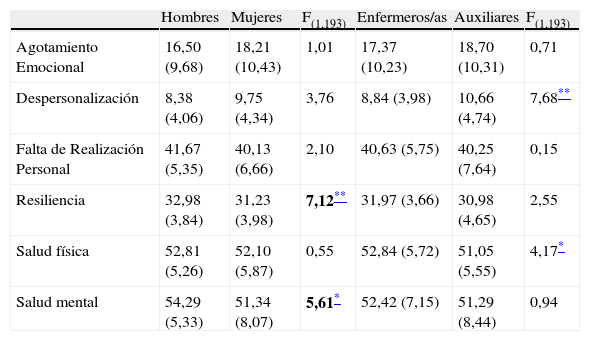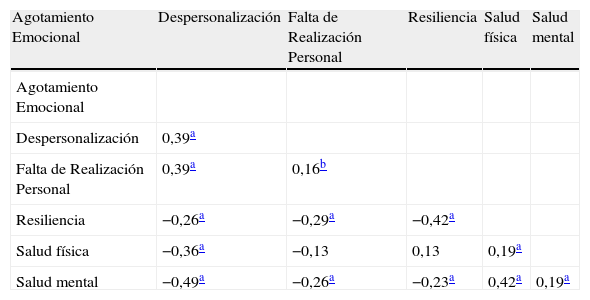Determinar las relaciones entre las 3 dimensiones del síndrome de burnout (Agotamiento Emocional, Despersonalización y Falta de Realización Personal), la salud (física y mental) y la resiliencia, y analizar el papel mediacional de esta última en las relaciones entre el burnout y la salud en una muestra de personal de Enfermería.
MétodoEstudio correlacional de tipo transversal con muestreo probabilístico. Participó una muestra de 194 profesionales de la Enfermería del Hospital Universitario de Fuenlabrada (Madrid), formada por enfermeros/as (n=133) y auxiliares (n=61). Instrumentos: MBI-HSS (síndrome de burnout), SF-12v1 (componentes físico y mental de la salud), 10-Item CD-RISC (resiliencia) y variables sociodemográficas.
ResultadosLos análisis correlacionales mostraron que la salud mental se relacionó negativamente con las 3 dimensiones del burnout y positivamente con la resiliencia. Por el contrario, la salud física solamente se relacionó negativamente con el Agotamiento Emocional y positivamente con la resiliencia. Los análisis mediacionales revelaron que la resiliencia medió, por un lado, las relaciones entre el Agotamiento Emocional y la Despersonalización con la salud mental (mediación parcial), y por otro lado, las relaciones entre la Falta de Realización Personal con la salud mental (mediación total).
ConclusionesLa resiliencia no solamente es relevante para mejorar la salud mental del personal de Enfermería, sino también para amortiguar y minimizar las consecuencias negativas del estrés laboral al que está expuesto en su trabajo, cuyo resultado más adverso es la aparición del burnout. Por lo tanto, el entrenamiento de la resiliencia debería ser promovido para mejorar la práctica clínica enfermera.
To determine the relationships between 3 burnout dimensions (Emotional Exhaustion, Depersonalization, and Reduced Personal Accomplishment), health (physical and mental health), and resilience, as well as to analyse the mediator role of resilience in relationships between burnout and health in a sample of Nursing staff.
MethodA correlational and cross-sectional study with probabilistic sampling was conducted on a sample of 194 Nursing staff of University Hospital of Fuenlabrada (Madrid), and composed of nurses (n=133) and nursing assistants (n=61). Instruments: MBI-HSS (burnout syndrome), SF-12v1 (physical and mental components of health), 10-Item CD-RISC (resilience), and sociodemographic variables.
ResultsCorrelational analyses showed that mental health was negatively related with 3 burnout dimensions and positively with resilience. Furthermore, physical health was only negatively related with Emotional Exhaustion, and positively with resilience. Mediational analyses revealed that resilience mediated, on one hand, the relationship between Emotional Exhaustion and Depersonalization with mental health (partial mediation) and, on the other hand, the relationship between Reduced Personal Accomplishment and mental health (total mediation).
ConclusionsResilience is not only important to improve the mental health of Nursing staff, but also to buffer and minimize the negative consequences of the occupational stress to which they are at risk, with its most adverse result being signs of burnout. Therefore, resilience training should be promoted to improve nursing clinical practice.
Artículo
Comprando el artículo el PDF del mismo podrá ser descargado
Precio 19,34 €
Comprar ahora












